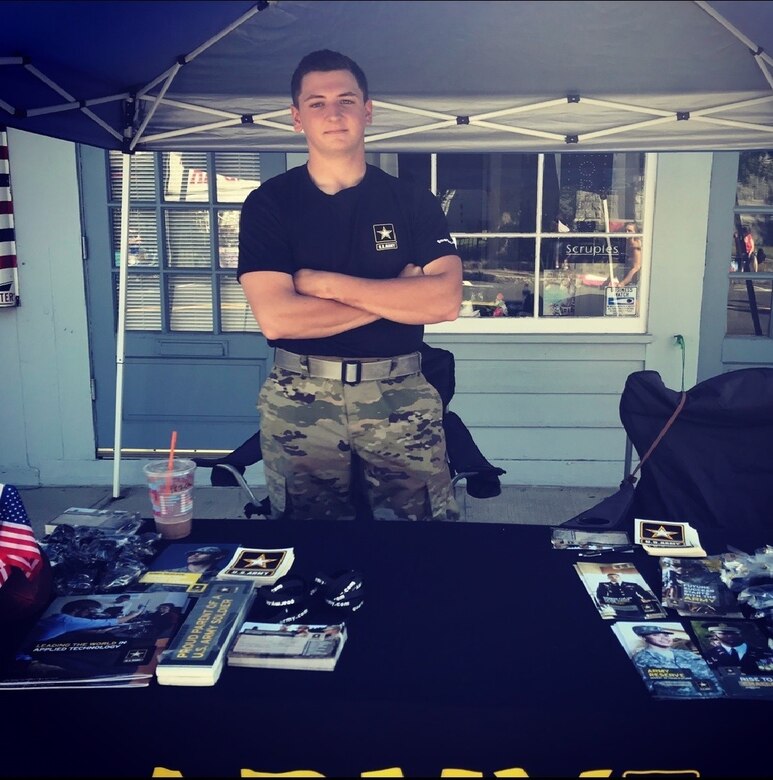By Army Sgt. 1st Class Victor Gardner, 1st Infantry Division
Sustainment Brigade
FORT RILEY, Kan. -- Army Sgt. Tyler Martin, a chemical,
biological, radiological and nuclear noncommissioned officer with the 24th
Composite Transportation Company here, was among the first wave of soldiers
from Fort Riley to participate in a Defense Department initiative -- the
Special Recruiter Assistance Program -- from June 23 through July 24 in Monson,
Massachusetts, in order to provide a home-grown face to a town with possible
military recruits.
SRAP brings a total of 3,000 soldiers to recruiting stations
across the nation. Each soldier spends 30 days supporting local outreach
efforts to create awareness of the Army lifestyle and career opportunities in
an area where they have lived, worked or have a significant personal tie.
According to Army Maj. Gen. Jeffery Snow, commander of U.S.
Army Recruiting, about 50 percent of young people admit to knowing little about
their own nation's military and even struggle to name all the services. This is
where SRAP and soldiers such as Martin come into play.
Trying Something New
Martin learned of the opportunity to be close to home and
try something that was new to him; recruiting. Or, as he puts it, “Learning
about a new persons’ story with every encounter.”
“I’m not really nervous about talking to other people, but
that’s when we are all in the same shop,” Martin said. “I really didn’t know
what I was getting into. I just knew that I was going to be home recruiting. I
went in not knowing too much about recruiting but I decided to do it.”
Martin was one of 20 soldiers from the 1st Infantry Division
Sustainment Brigade to interview with Army Command Sgt. Maj. Matthew Majeski,
the brigade’s senior noncommissioned officer, for this great opportunity. He
says that the turnaround time for his selection was very fast.
“I wasn’t expecting much to happen but I got a call to go in
and speak with [Majeski] during a four-day [weekend],” Martin said. “I talked
with the command sergeant major and he told all of us to stay flexible and he
would be in touch.
“I didn’t think much about it and when I told my wife she
didn’t think it was going to happen,” he said. “A few days later I get a call
and [was] told I’m headed out in a few days. It was like an eight-day
turnaround from the time I talked with [the] command sergeant major and me
being on a flight home.”
Recruiting Duty
Once Martin arrived at the Monson recruiting station he
began learning how to speak to and with potential recruits. He was assigned to
Army Sgt. Jason Duffy, a recruiter for the Monson station.
“When I met Sgt. Duffy, he welcomed me and began to tell me
about the station and what it is they do,” Martin said. “He showed me the ropes
-- how to fill out the information cards and gave me a bunch of business cards
[and] we went out the door to prospect. He took me over the mall and said,
‘Just watch what I do.’ He took me around and taught me what to say and not to
say. It was really fun.”
Martin said the recruiting experience was different from the
other side of the desk.
“I got to learn a whole lot of stuff that I didn’t know when
you’re on this side of it,” he said. “When you’re trying to enlist, you never
see what’s going on behind closed doors. When you’re doing the recruiting
system and doing the SRAP, it’s like you learn a lot of stuff that you never
knew before.”
“I learned about meeting mission,” Martin said. “I learned
that certain [military occupation specialties] have bonuses and others don’t
and they [the recruiters] can see all of that. But mainly you learn about
people and what they want to do later on in their careers, like go into the
police force.”
Success
After a week, Duffy allowed Martin to speak to prospects on
his own. Martin said that he had earned the trust of Duffy and the other
recruiters at the station.
“Sgt. Duffy and I would go out as a team and take turns just
talking to people about military life and the benefits,” he said. “It was more
so about listening to what the person wanted and to help them. I actually found
myself talking to prospects late at night, like around 9 p.m. at Walmart while
I’m with my wife. But I found it to be more than a job because I wanted to make
sure the station met their mission and it was fun.”
During his time at the Monson recruiting station, Martin
succeeded at a challenge made by the station’s first sergeant.
“When I got my initial counseling from the first sergeant,
he said that he hadn’t done recruiting in a while,” Martin said. “But he said
he could put one [recruit] in before me. Well, one day a kid I had talked to
walks into the station with a card in his hand and says, ‘Someone gave me this
card a week ago and I’m here to get more information.’ All the sergeants were
looking around at each other asking who it was and then I said, ‘I remember you
and I’m glad you came in.’ The other sergeants were like ‘How did you do that?’
I just smiled and since I don’t know too much I let the actual recruiters take
over. It was pretty cool.”
Martin said that toward the end of his time at the station,
he began to really like working with the recruiters there, explaining that he
enjoyed how they helped one another, and hopes to one day become a recruiter
himself.
“Man I really enjoyed my time there,” he said. “I would love
to be a recruiter and go work back in that station.”

No comments:
Post a Comment